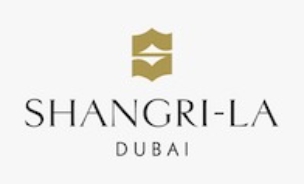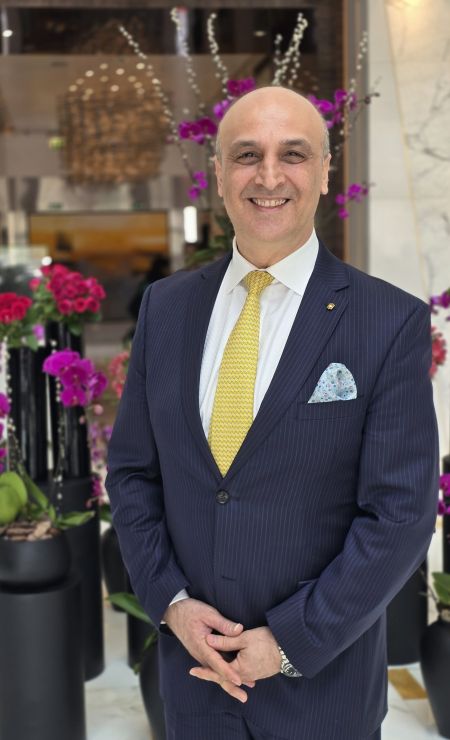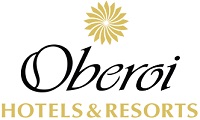
HAKAN OZEL, AREA GENERAL MANAGER, OPERATIONS OF SHANGRI-LA DUBAI: "HOSPITALITY REQUIRES DEDICATION AND LOVE" (United Arab Emirates)
A hotelier for more than 26 years, Hakan Ozel spent 20 of them at Shangri-La Group and shares his insights on luxury hospitality in the UAE. |
 |
HAKAN OZEL, AREA GENERAL MANAGER, OPERATIONS OF SHANGRI-LA DUBAI: "HOSPITALITY REQUIRES DEDICATION AND LOVE" (United Arab Emirates)
A hotelier for more than 26 years, Hakan Ozel spent 20 of them at Shangri-La Group and shares his insights on luxury hospitality in the UAE. |
Category: Middle East - United Arab Emirates - Careers
- Interviews and portraits
- Career - Interviews - Industry leaders
Interview made by Sonia Taourghi on 2024-05-30
 Hakan Ozel, Area General Manager, Operations of Shangri-La Dubai in the lobby of the Shangri-La Dubai
Photo credit © Sonia Taourghi / Journal des Palaces
He joined Shangri-La Dubai in 2017 as General Manager, and in 2023, his role got expanded to his current responsibilities.
In total, Hakan Ozel has been part of the Shangri-La Group for close to 20 years and a hotelier for more than 26. An avid traveller, his career also got him to experience different cultures in People’s Republic of China, United Arab Emirates, Egypt, Sukatante of siman, Indonesia, and his native country Türkiye.
"When I became the General Manager the first time, he told me, I wanted to be very successful. I was pushing, trying to deliver the result, and it was just great. The second time I became a GM, I was more experienced. When I came to a certain experience and maturity level, then making other people successful became a great pleasure for me".
A reflection on his journey, which probably explains his natural authority and the respect expressed by anyone I talked to during my visit.In our conversation, we discuss his career, luxury hospitality in the area and his insights into the profession.
Journal des Palaces: What attracted you to luxury hospitality in the first place?
Hakan Ozel: Luxury hospitality is more than just a career for me. My passion stems from my love of travel, culture, and service. Ever since I was a child, I have been fascinated by how people live, celebrate, and enjoy life around the world. We were hosting our relatives from the former Yugoslavia when they visited our hometown in Turkey. Welcoming and hosting the guests is our tradition. I wanted to experience the beauty and diversity of different places and to share it with others. Luxury hospitality allows me to do both. I can immerse myself in the rich and unique traditions of each destination, and create memorable and personalised experiences for my guests. Luxury hospitality is not just about providing comfort and convenience, but also about anticipating, exceeding expectations, and delivering excellence. It is a rewarding and fulfilling profession that challenges me to grow and learn every day. Making others happy is our profession at the end. Luxury hospitality is what attracted me to this industry, and what keeps me motivated and inspired.
You have a long history with Shangri-La. What do you think sets the brand apart?
I have been working for Shangri-La Group for almost 20 years. I have seen the group grow and evolve in many ways. We are a relatively smaller company compared to others; everyone knows each other, which is great. What sets Shangri-La apart is its commitment to its people and their development. Many of us grew from within, which is a part of our culture in the group. Service innovation and continuous focus and emphasis on quality have always been on our agendas. Shangri-La, with its roots in the Asian heritage, is always looking for new ways to improve its products and services to meet the changing needs of the guests in markets where we own and operate the hotels. The Group is encouraging relationships and collaboration among its employees strongly. Finally, it values loyalty and aims to build long-term relationships with its guests.
What are the biggest changes and challenges for luxury hospitality you observed in the area?
There is an increasing demand for personalised and experiential services since the number of existing and upcoming luxury hotels is at a high number. Personalised and experiential services are what make the hotel distinguished from the others. Another challenge, also an opportunity, is adapting to new technologies and sustainability standards, which are developing and changing continuously. There is a high number of luxury hotels and establishments for guests to choose from. As such, there is fierce competition to capture and retain the guests.
As a GM, I have to ensure that I have to bring the outside world inside: the property isn't just a hotel any more, but it gives them a lifestyle. In that regard, partnerships became very important. If we’re looking at the top luxury brands like Gucci, partnering with Adidas, MiuMiu partnering with New Balance, Omega with Swatch, or other brands partnering with Nike, we can see that it is a key strategy. It is great that two forces are coming together, and they become more powerful and better answer the luxury needs of a larger community.
With so many luxury hotel openings just in the last year, how do you keep the brand and the hotel in Dubai attractive?
Dubai is a dynamic and competitive market for luxury hotels, with many new openings in the past year, and many in the pipeline. To stand out from the crowd, the brands and the hotels in Dubai need to focus on some important key aspects. We focus on innovation, personalised service, and sustainability.
We offer unique and memorable experiences that showcase the best of Dubai's culture enhanced with our renown Asian Hospitality, cuisine, and entertainment. For example, we host themed events, partner with local artists, and create immersive attractions including dining in our premises.
We tailor-make our services and amenities to the preferences and needs of each guest. Our internal and unique systems support this kind of services very much. For example, we can use feedback from guests and customise the rooms, F&B menus, spa, or other related activities whenever they stay with us or whichever Shangri-La they stay at. The best strategy in service business is ‘Management by Guest’.
Finally, we demonstrate deep commitment to environmental and social responsibility. We implement green practices, support local communities, and promote ethical tourism. We have long years of partnership with Emirates Dawn Syndrome Association, which is a true commitment of Shangri-La Dubai. By focusing on these areas, we attract and retain loyal customers who value quality and authenticity for Shangri-La Dubai as well as for Dubai.
Who are your target customers?
Our guests are business travellers who seek luxury, convenience, attention to detail, and personalised service. They are mainly leisure travellers who want to enjoy the city's attractions and culture. Event organisers who need spacious and elegant venues furnished with state-of-the-art technology and equipment, and close proximity to primary city destinations are our clients.
What are your biggest challenges when recruiting?
We have a couple of challenges. One of them is finding candidates with the right skills, attitude, and personality to deliver exceptional service and create memorable experiences for guests in a luxury service environment. Another one is competing with other luxury hotels, and hospitality brands such as freestanding restaurants and bars for the best talent in the market during the hiring stage and retaining afterward. Finally, after recruiting, and motivating the talent in a high-demanding work environment to retain them.
What would be your advice to someone looking to pursue a career in luxury hospitality in the Emirates?
Hospitality itself needs dedication and love. I recommend that the potential professionals should search the market and the culture of the UAE before they arrive. They should learn some basic Arabic and a few phrases to communicate because learning the culture and adapting starts with the local language. Professional networks and alumni associations in the sector are very powerful, but there are also many professional clubs, professional comities, and events where you can get help and feedback. Developing their knowledge and skills through courses, internships, and certifications is a good way to keep them competitive. It's important to be different from the rest. Millions of people would like to come and work in the United Arab Emirates, so being different is a way of standing out. Highlighting their passion, creativity, and adaptability in their CV and at interviews will support their application. This is how they will be shortlisted and considered. Finally, they should be prepared to work hard, learn from challenges, and embrace diversity in the Emirates.
|
|






